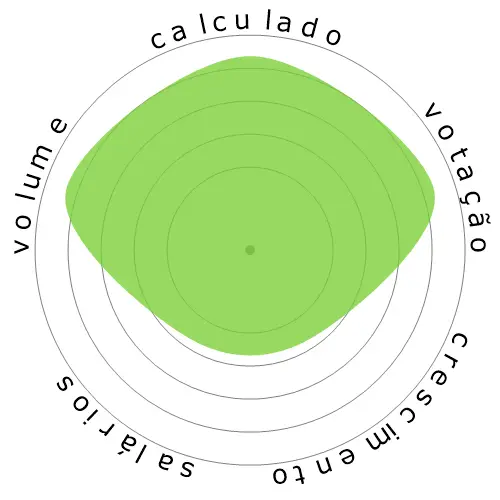Professores do Ensino Secundário, exceto Educação Especial e Técnica/Profissionalizante




As pessoas também visualizaram
Risco de automação calculado
Risco Mínimo (0-20%): Ocupações nesta categoria têm uma baixa probabilidade de serem automatizadas, pois geralmente exigem resolução complexa de problemas, criatividade, fortes habilidades interpessoais e um alto grau de destreza manual. Esses trabalhos geralmente envolvem movimentos de mão intrincados e coordenação precisa, tornando difícil para as máquinas replicarem as tarefas necessárias.
Mais informações sobre o que é essa pontuação e como ela é calculada estão disponíveis aqui.
Enquete do usuário
Nossos visitantes votaram que há uma baixa chance de esta ocupação ser automatizada. Esta avaliação é ainda mais apoiada pelo nível de risco de automação calculado, que estima 16% de chance de automação.
O que você acha que é o risco da automação?
Qual é a probabilidade de que Professores do Ensino Secundário, exceto Educação Especial e Técnica/Profissionalizante seja substituído por robôs ou inteligência artificial nos próximos 20 anos?
Sentimento
O gráfico a seguir é incluído sempre que há uma quantidade substancial de votos para gerar dados significativos. Essas representações visuais mostram os resultados das enquetes dos usuários ao longo do tempo, fornecendo uma indicação importante das tendências de sentimento.
Sentimento ao longo do tempo (anualmente)
Crescimento
Espera-se que o número de vagas de emprego para 'Secondary School Teachers, Except Special and Career/Technical Education' diminua 0,6% até 2033
Emprego total e estimativa de vagas de emprego
As projeções atualizadas são devidas 09-2025.
Salários
Em 2023, o salário anual mediano para 'Secondary School Teachers, Except Special and Career/Technical Education' foi de $ 65.220, ou $ 31 por hora
'Secondary School Teachers, Except Special and Career/Technical Education' receberam 35,7% a mais do que o salário médio nacional, que era de $ 48.060
Salários ao longo do tempo
Volume
A partir de 2023 havia 1.045.170 pessoas empregadas como 'Secondary School Teachers, Except Special and Career/Technical Education' dentro dos Estados Unidos.
Isso representa cerca de 0,7% da força de trabalho empregada em todo o país
Dito de outra maneira, cerca de 1 em 145 pessoas são empregadas como 'Secondary School Teachers, Except Special and Career/Technical Education'.
Descrição do trabalho
Ensine uma ou mais matérias para estudantes do ensino secundário.
SOC Code: 25-2031.00


Comentários
Leave a comment
Due to remote learning and using similar designs that you mentioned, we have seen a 210% spike in high school drop outs, a 600% up shot of kids having at least 2-3 failing grades, and a gap between students who do not have access to tutors, internet or computers (or all three). A robot cannot tell an elementary student to reengage their students, let alone the sheer horror of classroom discipline being thrown out. Also, lets be real honest with secondary students, if they are given a generic problem trust me they will plagiarize and copy that down (just look at quizlet, or "write my paper" for proof). A human being needs to see if a student "gets" what is going on. A Teacher needs to have group interactions (and trust me you cannot do any sort of interactions with remote even with current programs- students just shut their cameras and mute themselves). Unless you are suggesting that a "few" will benefit from this dystopia, if so thank you Nancy Devos for your insight, but we educate everyone, and not the 1%.
Do you think the software being used led to those changes or the pandemic and economic downturn itself?
Easy to pass judgment when you have already drawn your conclusions. I've taught off and on since 2008 (mostly on, mostly secondary). Quizlet is the worst example you could provide of instructional technology we could employ to help all students.
When you discuss the one percent, you highlight a certain security the wealthy have that leads to less interruptions of education and that's a fair point. But I am not trying to describe a dystopia, but rather a better way to differentiate and tailor student learning to their particular needs, desires, strengths, and weaknesses.
Much of what effective teachers do is driven by inputs, points of data, about their students and their teaching. A properly designed system could analyze those inputs and apply strategies to intervene. It doesn't really matter the input, either.
Now that we are rolling out SEL technologies to help our kids, language translation applications that can help English learners, standards-based, interactively branching assessments and activities, the amount of information received is nothing trivial. The digital divide does truly make this a difficult prospect for some students, but that's not the question we are discussing here. Can teachers be replaced by "robots" in the future? Yes. Nothing would be more student-centred.
If the argument is about the socialization of students, that's not facilitated by teachers. It's actually stunted. Imagine learning plans that don't waste time with sages on stages. Imagine a truly adaptive system to check for understanding and intervene. Imagine that happening simultaneously for all students without the interruptions all teachers face daily just trying to teach. I realize virtual, and hybrid, learning did not go well for all students, but it was year one...something never attempted, and there was a society gone wild coupled with the inexperience of systems, personnel, and students.
I love teaching. I take it personally. But, if students were able to learn better from a robot than from me, I wouldn't take it personally. I'd celebrate it.
Learning with a teacher can mean a number of scenarios, including utilizing the learning software you mentioned.
The assurance of having someone who knows more than you, or at least knows where to find answers and explain them, will result in teachers have a very secure job.
I haven't even mentioned the emotional support and connection that makes a learning environment better, something I don't foresee AI replacing because seeing assuring words pop up on my screen is not the same as hearing it from a teacher, who is making eye contact with me and using body language.
Deixe uma resposta sobre esta ocupação